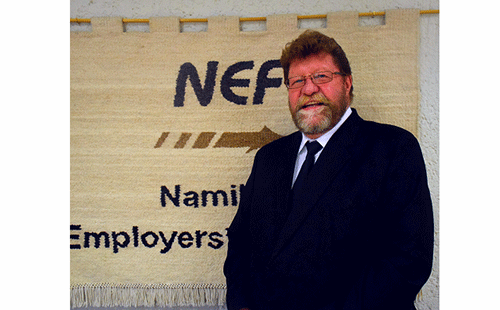Employers have thrown their weight behind the growing dissatisfaction with the Financial Institutions Markets Act (FIMA), as they believe the new law poses severe risks and imposes strict obligations on employers.
Namibian Employers’ Federation this week expressed grave concern on behalf of its members.
They join pension fund administrators, opposition parties, unions and individuals who have rejected FIMA.
National Unity Democratic Organisation secretary general Josef Kauandenge last week said it is heartless to say when you resign at 35 years of age, you must wait another 20 years in misery and poverty before accessing your hard-earned money.
He called the act a political gimmick, aimed at appearing to be concerned with the welfare of workers.
NEF secretary general Daan Strauss said, “NEF hereby wishes to express, on behalf of its members, and indeed all employers in Namibia, its grave concerns about FIMA coming into effect”.
FIMA, which was gazetted on 30 September 2021, replaces the outdated Pension Fund Act of 1956, and will come into effect on 1 October 2022.
Under chapter 5 of the FIMA, the new retirement funds law, he said, poses severe risks and imposes strict obligations on employers.
“Employers are currently not obliged to provide retirement benefits to their employees. It is our opinion that FIMA, in its present form, could be devastating for employers – and in the long run, also for the Namibian economy,” he pointed out.
Comparing the Pension Funds Act with FIMA, Strauss noted employers only had one obligation towards the fund – payment of contributions within seven days of the month in respect of which they were deducted.
Failure to pay contributions as required constitutes an offence, and the offender is liable to a fine not exceeding N$200 upon conviction.
Under FIMA, the employers’ obligations and liability for fines will take on new dimensions.
The company, its directors and officers shall remain jointly and severally liable for any unpaid contributions and the prescribed interest thereon.
Any director or officer may, thus, face personal prosecution to recover outstanding contributions.
The federation is of the view that thousands of people potentially could become unemployed and become dependent on the State for survival.
“The government’s response is seemingly to slaughter the goose laying the golden eggs. The NEF certainly trusts that this is not an effort from the government to make up for their own failure to make the economy grow, to create job opportunities and to create room for economic investments.”
The real concern, Strauss said, is that the intended new legislation may well make a prospective employer think twice about offering a pension fund to their employees.
This, he said, will have a devastating social impact on employees.
According to him, experience had shown that far too few employees take timeous efforts to contribute to a pension fund if they need to make such a decision on their own.
Commenting on FIMA, local economist Klaus Schade explained that contributions to pension funds are meant to ensure a dignified life after retirement.
“It would, therefore, make sense to keep these contributions until the (early) retirement age is reached. However, employees are faced sometimes with emergency situations such as unemployment and are left with no income and often no savings to maintain their livelihoods,” said Schade.
He advised that a solution could be to split the current contributions to a pension fund into two separate contributions, namely contributions for the retirement age that are left untouched until a certain age is reached and a contribution to a saving or investment fund, which is accessible to cover other financial obligations, noting that contributions to this second fund would not be tax-deductible like the pension fund contributions.
The economist believes the current discussions, however, indicate a need for a more fundamental review of the current social safety net.
“Unemployment benefits and a national pension fund based on the solidarity principle with compulsory contributions from each employee and/or employer with a defined benefit after retirement have been discussed for a long time,” he pointed out.
According to Schade, there is a need for a thorough public debate with all relevant stakeholders to explore the different options, advantages and disadvantages, agree on the way forward and implement what has been agreed upons.
NEF said FIMA passed the parliament without much discussion and deliberation.


